
Raspberry Pi as server
Setup & config options
Raspberry Pi first usage
Suitable power supply
RasPi & sFTP file transfer
Home network print server
Home network scan server
Mesh : home Lan USB drive
Explore hard & software
UFW firewall explained
Secured by fail2ban server
Software packaging & PPA
Suitable power supply
RasPi & sFTP file transfer
Home network print server
Home network scan server
Mesh : home Lan USB drive
Explore hard & software
UFW firewall explained
Secured by fail2ban server
Software packaging & PPA
Apache 2.4+ LAMP server
http web server : port 80
https web server : port 443
Varnish caching proxy
Module : cgi & perl
Module : geoip
Modules : php & mysql
http*s error handling
Server : conditional logging
TL-domain & dynamic DNS
Webalizer log analyser
Defeat referrer spam
robots.txt & xml sitemaps
Server : .htaccess handling
https web server : port 443
Varnish caching proxy
Module : cgi & perl
Module : geoip
Modules : php & mysql
http*s error handling
Server : conditional logging
TL-domain & dynamic DNS
Webalizer log analyser
Defeat referrer spam
robots.txt & xml sitemaps
Server : .htaccess handling
»Windward« server
The game & not the islands
Setup & config options
Some off-topics
North Atlantic : Macaronésia
Front desk clerk
🚫 No ads & tracking
Tag cloud
apache
azores
cinematique
fail2ban
firefox web browser
foss
dosboot
linux
madeira
media
portugal
raspberry pi
spam
xml sitemap
ubuntu budgie
ufw
varnish cache
weather widget
webalizer analyser
windward
Scan QRC bookmark
 W3 Directory resources | Linux derivates and distributions
W3 Directory resources | Linux derivates and distributions
This W3 directory with links and Wiki is a tiny online encyclopedia, created and edited by one volunteer and self-hosted on a Raspberry Pi 4B mini-board.  Indicates for a web content created recently.
Indicates for a web content created recently.
Caution  Proprietary and untested third-party software sources can threaten the system.
Proprietary and untested third-party software sources can threaten the system.
 |
Raspberry Pi desktop edition for PC and Mac | |
Debian with Raspberry Pi Desktop is the operating system for PC and Mac. It provides the Raspberry Pi OS desktop, as well as most of the recommended software that comes with Raspberry Pi OS, for any PC or Apple Mac computer. If you have an old computer that is no longer powerful enough to run a modern commercial operating system, try Debian with Raspberry Pi Desktop: it can often make the computer usable once more. 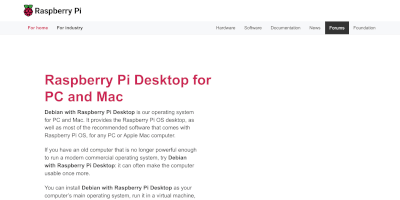 |
||
 |
Official Raspberry Pi OS | |
Your Raspberry Pi needs an operating system to work. This is it. Raspberry Pi OS (previously called as Raspbian) is the official supported operating system. 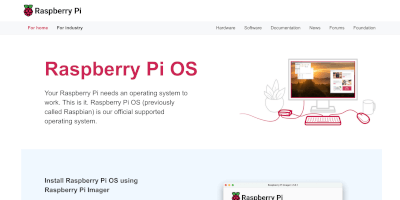 |
||
 |
The official Ubuntu | |
Ubuntu is a free and open-source Linux distribution based on Debian. Ubuntu is officially released in three editions: Desktop, Server, and Core for the internet of things (IoT) devices and robots. All the editions can run on the computer alone, or in a virtual machine. Ubuntu is a popular operating system for cloud computing, with support for OpenStack. 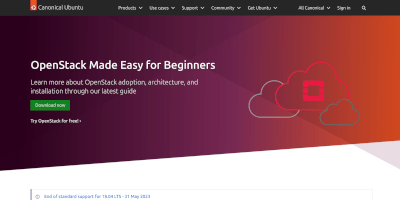 |
||
 |
Ubuntu Budgie | |
Ubuntu Budgie - Simplicity and Elegance in one package. Ubuntu Budgie is a community developed distribution, integrating the Budgie Desktop Environment with Ubuntu at its core. Whether you are using it on an old computer, or a powerful workstation, Ubuntu Budgie is adaptable to any device, keeping them fast and usable. It's a lightweight OS free of bloat with modest hardware requirements, but still manages to contain everything an average user might need. 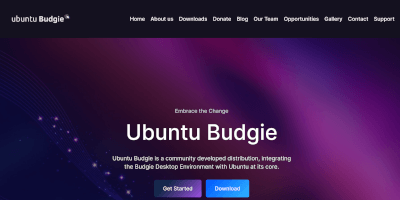 |
||
 |
Debian GNU/Linux | |
Debian is one of the oldest operating systems based on the Linux kernel. The project is coordinated over the Internet by a team of volunteers guided by the Debian Project Leader and three foundational documents: the Debian Social Contract, the Debian Constitution, and the Debian Free Software Guidelines. New distributions are updated continually, and the next candidate is released after a time-based freeze. 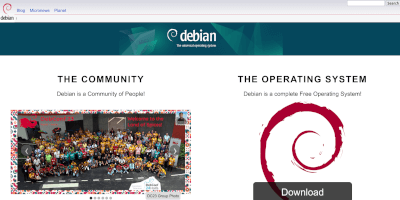 |
||
 |
Kubuntu | |
Kubuntu is an official flavour of the Ubuntu operating system which uses the KDE Plasma Desktop instead of the GNOME desktop environment. As part of the Ubuntu project, Kubuntu uses the same underlying systems. Every package in Kubuntu shares the same repositories as Ubuntu, and it is released regularly on the same schedule as Ubuntu. 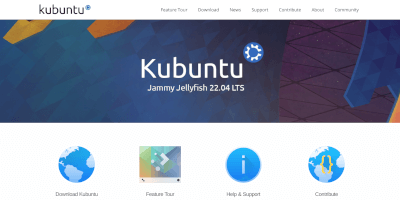 |
||
 |
Lubuntu - The official Lubuntu home | |
Lubuntu is a lightweight Linux distribution based on Ubuntu, using the LXQt desktop environment in place of Ubuntu's GNOME desktop. Lubuntu was originally touted as being "lighter, less resource hungry and more energy-efficient", but now aims to be "a functional yet modular distribution focused on getting out of the way and letting users use their computer". 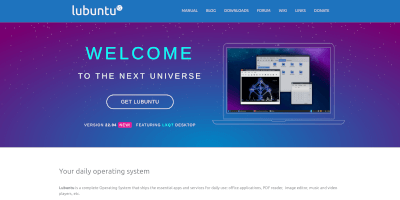 |
||
 |
Xubuntu - Community developed operating system | |
Xubuntu is a Canonical Ltd.–recognized, community-maintained derivative of the Ubuntu operating system. The name Xubuntu is a portmanteau of Xfce and Ubuntu, as it uses the Xfce desktop environment, instead of Ubuntu's GNOME desktop. It provides an easy to use distribution, based on Ubuntu, using Xfce as the graphical desktop, with a focus on integration, usability and performance, with a particular focus on low memory footprint. The integration in Xubuntu is at a configuration level, a toolkit level, and matching the underlying technology beneath the desktop in Ubuntu. Xubuntu will be built and developed autonomously as part of the wider Ubuntu community, based around the ideals and values of Ubuntu. 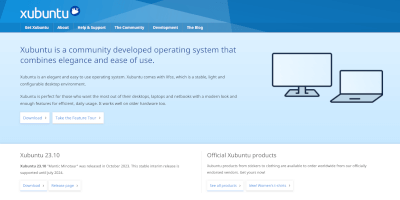 |
||
 |
MX Linux - Midweight simple stable desktop OS | |
MX Linux is a cooperative venture between the antiX and MX Linux communities. It is a family of operating systems that are designed to combine elegant and efficient desktops with high stability and solid performance. MX’s graphical tools provide an easy way to do a wide variety of tasks, while the Live USB and snapshot tools inherited from antiX add impressive portability and remastering capabilities. Extensive support is available through videos, documentation and a very friendly forum. 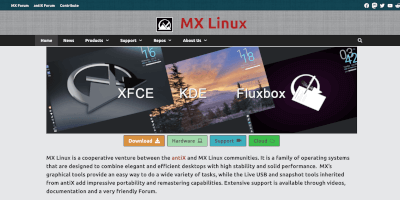 |
||
 |
Manjaro Linux OS | |
Manjaro is a versatile open-source Linux operating system designed with a strong focus on safeguarding user privacy and offering extensive control over hardware. This user-friendly OS is an excellent choice for those who seek a fresh computing experience, as it can be seamlessly installed on a diverse array of devices. With support for both x86-64 and ARM architectures, Manjaro stands as an ideal option for any device or computing environment. Furthermore, Manjaro provides an array of customization options and a rich selection of applications, all while prioritizing security and privacy features. To cater to a wide audience. 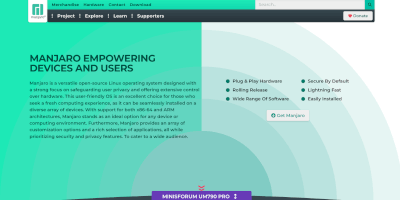 |
||
 |
Linux Mint OS | |
The purpose of Linux Mint is to produce a modern, elegant and comfortable operating system which is both powerful and easy to use. Linux Mint is one of the most popular desktop Linux distributions and used by millions of people. Some of the reasons for the success of Linux Mint are: It works out of the box, with full multimedia support and is extremely easy to use. It's both free of cost and open source. Based on Debian and Ubuntu, it provides about 30.000 packages and one of the best software managers. 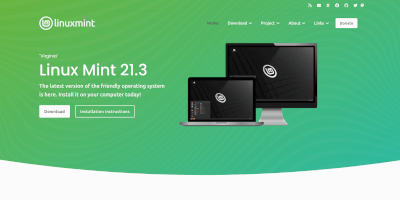 |
||
 |
Linux Lite - Easy to use free OS | |
Linux Lite is a free easy to use Linux based operating system that is suitable for people who are new to Linux. Linux Lite 6.0 uses the latest Ubuntu 22.04 LTS as its foundation, paired with Linux kernel 5.15, and the nimble Xfce 4.16 desktop environment. Although it runs fine on modern machines Linux Lite is tailored towards use on older and/or resource-limited hardware. 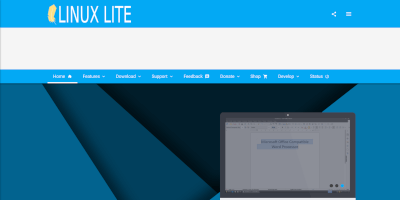 |
||
 |
The CentOS Project | |
CentOS from Community Enterprise Operating System is a Linux distribution that provides a free, community-supported computing platform functionally compatible with its upstream source, Red Hat Enterprise Linux (RHEL). The first CentOS release in May 2004, numbered as CentOS version 2, was forked from RHEL version 2.1AS. CentOS version 7.0 officially supports only the x86-64 architecture, while versions older than 7.0-1406 also support IA-32 with Physical Address Extension (PAE). As of December 2015, AltArch releases of CentOS 7 are available for the IA-32 architecture, Power ISA, and for the ARMv7hl and AArch64 variants of the ARM architecture. 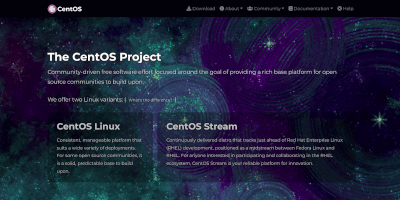 |
||
 |
archlinux - A simple, lightweight distribution | |
Arch Linux is a Linux distribution for computers with x86-64 processors. The Arch Linux repositories contain both libre, and nonfree software, and the default Arch Linux kernel contains nonfree proprietary blobs, hence the distribution is not endorsed by the GNU project. Arch Linux adheres to five principles: simplicity, modernity, pragmatism, user centrality and versatility. In general, the principles maintain minimal distribution-specific changes, minimal breakage with updates, pragmatic over ideological design choices, user-friendliness, and minimal bloat. A package manager written specifically for Arch Linux, Pacman, is used to install, remove and update software packages. Arch Linux uses a rolling release model, meaning there are no "major releases" of completely new versions of the system; a regular system update is all that is needed to obtain the latest Arch software; the installation images released by the Arch team are simply up-to-date snapshots of the main system components. 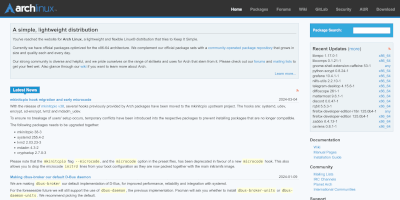 |
||
 |
Ubuntu Cinnamon | |
Community-driven, featuring Linux Mint’s Cinnamon Desktop with Ubuntu at the core, packed fast and full of features, here is the most traditionally modern desktop you will ever love. 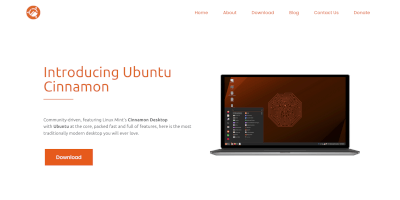 |
||
Updated 25-Mar 2024
